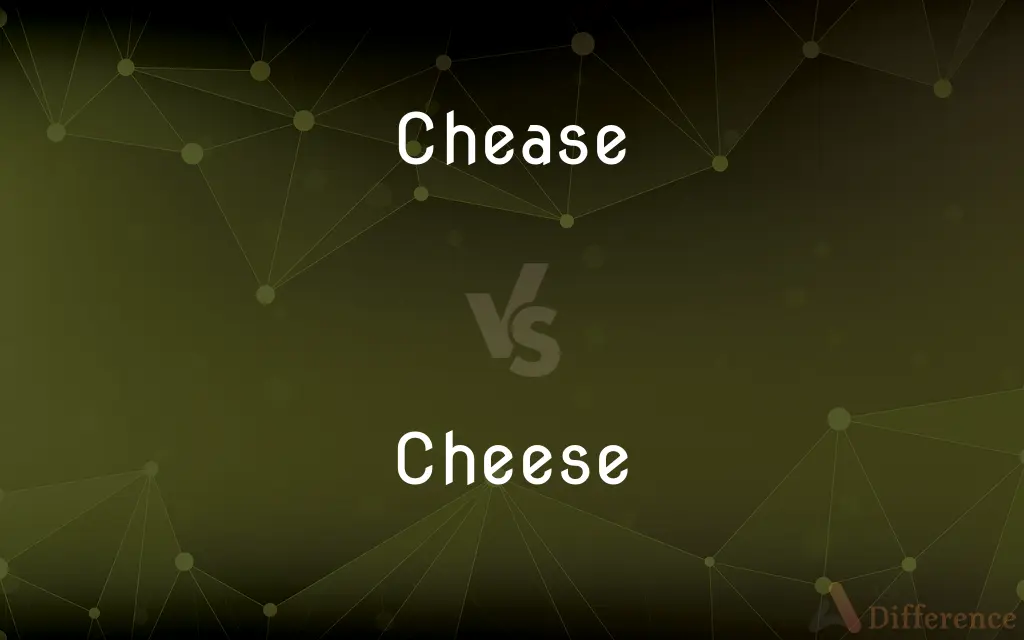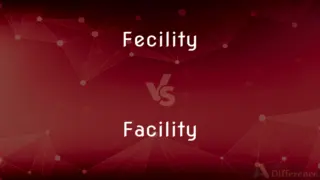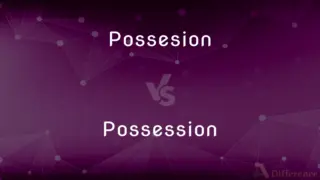Chease vs. Cheese — Which is Correct Spelling?
Edited by Tayyaba Rehman — By Fiza Rafique — Updated on April 1, 2024
"Changeing" is an incorrect spelling. "Changing" is the correct spelling, referring to the act or process of becoming different.

Table of Contents
Which is correct: Chease or Cheese
How to spell Cheese?

Chease
Incorrect Spelling

Cheese
Correct Spelling
ADVERTISEMENT
Key Differences
Connect "change" with "ring"; both integrate "-ing" without an extra "e."
"Change" becomes "changing" just like "make" becomes "making."
Visualize the process of a caterpillar "changing" into a butterfly, with no extra "e."
When adding "-ing" to a verb ending in "e," drop the "e": change + ing = changing.
Recite: "To show it's in motion, change loses its 'e' potion."
ADVERTISEMENT
How Do You Spell Cheese Correctly?
Incorrect: I love grilled chease sandwiches.
Correct: I love grilled cheese sandwiches.
Incorrect: His favorite type of chease is cheddar.
Correct: His favorite type of cheese is cheddar.
Incorrect: We need to buy more chease for the recipe.
Correct: We need to buy more cheese for the recipe.
Incorrect: She added extra chease to the pizza.
Correct: She added extra cheese to the pizza.
Incorrect: The chease platter was a hit at the party.
Correct: The cheese platter was a hit at the party.
Cheese Definitions
Altering or becoming different in some particular way.
The weather is constantly changing.
Modifying or adapting to new circumstances or conditions.
He's changing his career path.
Switching from one thing or position to another.
She's changing the baby's diaper.
Indicating the dynamic nature of something.
The changing landscape of technology fascinates me.
A solid food prepared from the pressed curd of milk, often seasoned and aged.
A molded mass of this substance.
Something resembling this substance in shape or consistency.
An important person.
To stop.
(uncountable) A dairy product made from curdled or cultured milk.
(countable) Any particular variety of cheese.
(countable) A piece of cheese, especially one moulded into a large round shape during manufacture.
A thick variety of jam (fruit preserve), as distinguished from a thinner variety (sometimes called jelly)
A substance resembling cream cheese, such as lemon cheese
That which is melodramatic, overly emotional, or cliché, i.e. cheesy.
Money.
In skittles, the roughly ovoid object that is thrown to knock down the skittles.
A fastball.
A dangerous mixture of black tar heroin and crushed Tylenol PM tablets. The resulting powder resembles grated cheese and is snorted.
Smegma.
(technology) Holed pattern of circuitry to decrease pattern density.
A mass of pomace, or ground apples, pressed together in the shape of a cheese.
The flat, circular, mucilaginous fruit of the dwarf mallow (Malva rotundifolia) or marshmallow (Althaea officinalis).
A low curtsey; so called on account of the cheese shape assumed by a woman's dress when she stoops after extending the skirts by a rapid gyration.
(slang) Wealth, fame, excellence, importance.
The correct thing, of excellent quality; the ticket.
These cheroots are the real cheese.
To prepare curds for making cheese.
(technology) To make holes in a pattern of circuitry to decrease pattern density.
(slang) To smile excessively, as for a camera.
(slang) To stop; to refrain from.
Cheese it! The cops!
Cheese your patter! (= stop talking, shut up)
(slang) To anger or irritate someone, usually in combination with "off".
All this waiting around is really cheesing me off.
To use a controversial or unsporting tactic to gain an advantage (especially in a game.)
You can cheese most of the game using certain exploits.
To use an unconventional, all-in strategy to take one's opponent by surprise early in the game (especially for real-time strategy games).
(photography) Said while being photographed, to give the impression of smiling.
Say "cheese"! ... and there we are!
The curd of milk, coagulated usually with rennet, separated from the whey, and pressed into a solid mass in a hoop or mold.
A mass of pomace, or ground apples, pressed together in the form of a cheese.
The flat, circular, mucilaginous fruit of the dwarf mallow (Malva rotundifolia).
A low courtesy; - so called on account of the cheese form assumed by a woman's dress when she stoops after extending the skirts by a rapid gyration.
A solid food prepared from the pressed curd of milk
Erect or decumbent Old World perennial with axillary clusters of rosy-purple flowers; introduced in United States
Used in the imperative (get away, or stop it);
Cheese it!
Wind onto a cheese;
Cheese the yarn
Evolving or undergoing transformation.
The city's skyline is rapidly changing.
Cheese Meaning in a Sentence
Cheese can be made from the milk of cows, goats, sheep, and even buffalo.
Cheese is often used in cooking for its ability to melt.
Cheese is a staple in many cuisines around the world.
Some people are lactose intolerant and cannot eat cheese.
Blue cheese is known for its distinctive veins of blue mold.
Cheese making is an ancient craft that dates back thousands of years.
Cheese can be soft, semi-soft, hard, or very hard.
Grated cheese is often sprinkled on top of pasta dishes.
There are hundreds of different types of cheese.
Aging cheese can enhance its flavor and texture.
Cheese boards are a popular way to serve a variety of cheeses to guests.
Cream cheese is commonly spread on bagels.
Cheese can be savored on its own or as part of a dish.
The process of smoking cheese adds a unique flavor.
Fondue is a dish made of melted cheese served in a communal pot.
Cheese is sometimes served with wine as a sophisticated pairing.
Some cheeses have a protected designation of origin to ensure quality.
Cheese festivals celebrate cheese and cheese-making traditions.
Cheese curds are a popular snack in some regions.
Mozzarella cheese is widely used on pizzas.
Common Curiosities
What is the verb form of Changing?
The base verb form is "change."
Which vowel is used before Changing?
The letter "a" is used in "changing."
Which conjunction is used with Changing?
Any conjunction can be used with "changing," like "and" or "but."
What is the root word of Changing?
The root word is "change."
Which article is used with Changing?
Both definite ("the") and indefinite ("a") articles can be used, depending on context.
Is Changing a negative or positive word?
"Changing" is neutral; its connotation depends on context.
Why is it called Changing?
"Changing" comes from the verb "change" to denote the action or process of becoming different.
What is the pronunciation of Changing?
Changing is pronounced as CHAYN-jing.
What is the plural form of Changing?
"Changing" does not have a plural form.
What is the singular form of Changing?
"Changing" is not a noun with plural or singular forms; it's a verb or gerund.
Which preposition is used with Changing?
Various prepositions can be used, such as "into" (changing into clothes).
Is Changing an adverb?
No, "changing" is not an adverb.
Is the Changing term a metaphor?
It can be used metaphorically, e.g., "the changing tides of time."
Is Changing a collective noun?
No, "changing" is not a collective noun.
Is Changing a noun or adjective?
"Changing" can be a noun (as in gerund) or adjective (e.g., changing moods).
Is Changing an abstract noun?
When used as a gerund (the act of changing), it can be considered abstract.
What is another term for Changing?
Transforming or altering.
Is Changing a vowel or consonant?
"Changing" is a word, not a letter. It starts with a consonant.
Is Changing a countable noun?
When used as a gerund, "changing" is uncountable.
Is the word Changing a gerund?
Yes, "changing" can function as a gerund.
Is the word Changing imperative?
No, "changing" is not imperative.
How many syllables are in Changing?
There are two syllables in Changing.
How do we divide Changing into syllables?
Change-ing.
What is a stressed syllable in Changing?
The first syllable "Change" is stressed.
Is the word “Changing” a Direct object or an Indirect object?
"Changing" can function as either, depending on the sentence.
What part of speech is Changing?
"Changing" can be a verb, a gerund (noun), or an adjective.
What is the opposite of Changing?
Remaining or staying.
Share Your Discovery

Previous Comparison
Fecility vs. Facility
Next Comparison
Possesion vs. PossessionAuthor Spotlight
Written by
Fiza RafiqueFiza Rafique is a skilled content writer at AskDifference.com, where she meticulously refines and enhances written pieces. Drawing from her vast editorial expertise, Fiza ensures clarity, accuracy, and precision in every article. Passionate about language, she continually seeks to elevate the quality of content for readers worldwide.
Edited by
Tayyaba RehmanTayyaba Rehman is a distinguished writer, currently serving as a primary contributor to askdifference.com. As a researcher in semantics and etymology, Tayyaba's passion for the complexity of languages and their distinctions has found a perfect home on the platform. Tayyaba delves into the intricacies of language, distinguishing between commonly confused words and phrases, thereby providing clarity for readers worldwide.


































